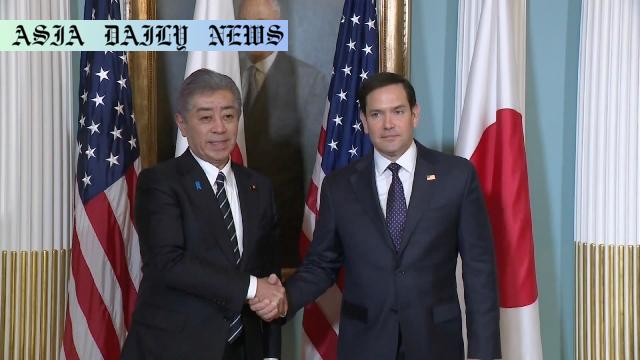Top diplomats discuss enhancing security and economic ties amid challenges from China and North Korea.
- Japanese and US diplomats agree to strengthen their alliance.
- Discussions focus on China, North Korea, and regional security.
- Officials aim for economic growth through cross-country partnerships.

Introduction
The diplomatic relationship between Japan and the United States has long been a cornerstone of security and stability in the Indo-Pacific region. Under the new leadership in the US, efforts are underway to enhance and elevate this alliance to address emerging regional and global challenges. This recent meeting between Japanese Foreign Minister Iwaya Takeshi and US Secretary of State Marco Rubio marked a significant moment in reinforcing ties between the two nations.
Commitment to a Free and Open Indo-Pacific
During their meeting in Washington, both diplomats reiterated their shared vision of a free and open Indo-Pacific. They agreed to strengthen the deterrence and response capabilities of their alliance, ensuring that both nations can effectively counter threats and maintain peace in the region. This commitment is seen as a direct response to increasing tensions caused by China’s militarization in the South China Sea and North Korea’s persistent nuclear threats.
Addressing the Challenges Posed by China and North Korea
A critical focus of the discussions was addressing the challenges posed by China and North Korea. Both nations emphasized the importance of coordinated responses to China’s growing assertiveness and North Korea’s missile and nuclear development programs. The officials also explored ways to enhance collaboration with other regional powers, including Australia, South Korea, and the Philippines, to create a unified front against shared security concerns.
Economic Collaboration and Investment
The talks also highlighted the importance of economic collaboration between Japan and the United States. Foreign Minister Iwaya brought up concerns surrounding the recent US decision to block the planned acquisition of US Steel by Japan’s Nippon Steel. Affirming the need for strong economic ties, the diplomats agreed on the significance of Japanese investments in the US, particularly in critical areas like economic security and advanced manufacturing.
Efforts to Resolve Abduction Issue
A unique and emotionally charged aspect of the discussions was the issue of Japanese citizens abducted by North Korean agents in the 1970s and 1980s. Japan has long sought international cooperation to bring closure to the families of these abductees. US National Security Advisor Mike Waltz expressed unequivocal support for Japan’s efforts, underscoring the shared humanitarian priorities of the two nations.
Plans for a High-Level Summit
In addition to their immediate discussions, the diplomats agreed to expedite arrangements for a high-level summit between Japanese Prime Minister Ishiba Shigeru and US President Donald Trump. Such a meeting, they believe, will further solidify the alliance and provide a platform for addressing long-term objectives.
Conclusion
The renewed commitment between Japan and the United States to strengthen their strategic alliance highlights the importance of diplomatic collaboration in meeting regional challenges. By addressing security threats, promoting economic partnerships, and focusing on humanitarian issues, this partnership is poised to continue playing a pivotal role in maintaining stability and progress in the Indo-Pacific region.



Commentary
The Importance of Elevated Alliances
The recent developments between Japan and the United States highlight the importance of evolving and adapting alliances to contemporary challenges. In a world where uncertainty prevails, nations must work together to ensure mutual security, economic stability, and global peace. The commitment to a free and open Indo-Pacific is not just a strategic objective but a reflection of shared values that transcend borders and cultures.
Collaboration as the Key to Stability
One of the most striking aspects of this meeting was its emphasis on collaboration. The joint approach to addressing North Korea’s provocations and China’s expanding influence is a testament to the power of partnerships. By involving like-minded nations like Australia, India, and South Korea, this alliance becomes a robust framework for maintaining regional equilibrium.
Economic Growth Through Strategic Alliance
Beyond military and security concerns, the focus on economic cooperation adds another dimension to the relationship. Investments, trade partnerships, and technological exchanges between Japan and the US have broader implications for global markets. Such cooperation not only benefits both nations but also contributes to a stable and prosperous global economy.
The Humanitarian Angle
The issue of Japanese citizens abducted by North Korea serves as a reminder that diplomacy is not just about grand strategies but also about addressing deeply personal and human concerns. The US’s support on this issue showcases the compassionate side of international relations and reinforces trust between nations.
Final Thoughts
As the US and Japan continue to strengthen their alliance, they set an example for other nations on the significance of unity in diversity. By prioritizing security, economic ties, and humanitarian values, their partnership can serve as a model for addressing the complexities of the 21st century.